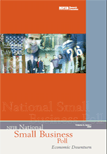Economic Downturn
• Forty-four (44) percent of small employers are spending more time at their business today
than six months ago, 27 percent a lot more time. Forty-one (41) percent of those spending
more time are doing so because the slowing economy means more matters to watch or attend
to. Ten (10) percent are spending less time. Of the group spending less time, one-third
blame a slowing economy saying they now have less to do.
• Increased marketing and sales activity is a common strategy to combat an economic slowdown.
However, this proves one of the least frequent approaches small business owners
employ to combat a perceived economic slowdown. For example, a similar number decreased
marketing and promotion due to an economic slowdown as increased it for the
same reason.
• Over the prior six months, small business owners are highly likely to have become more attentive
to their cash flow and inventory status. Two-thirds now watch their cash flow more
closely with 60 percent of that group attributing their action to a slowing economy. Of
those with inventories, 52 percent have been watching them more closely. Forty-six (46)
percent of those watching inventories more closely attribute their increased vigilance to a
slowing economy.
• Twenty (20) percent of small employers have reduced, postponed or cancelled a planned
investment(s) or reinvestment(s) in the last six months, though 11 percent increased plans.
A slowing economy is the primary reason for the curbed investment in over half of cases. An
absence of finance is practically never mentioned as a reason for reducing investment.
• Actions and behaviors stimulated by the economic slowdown or fear of a slowdown seem
to fall roughly into cash, sales/marketing, and banking categories. But owners do not have a
common plan or even an identifiable approach toward the slowing condition.
• Small employers view the current status and immediate prospects for their businesses favorably
much more often than they do for other businesses in the area. A slim majority
think business activity in their firm remains strong. However, a plurality sees business activity
in their area growing weaker.
• Small employers who describe their current business activity as strong are less likely to make
decisions based on a slowing economy than are those who think their business activity is soso
or weak. Yet, owners who experience strong business activity have been hedging against
an economic slowdown and often cite the slowdown as the primary reason for their action.
• Seventy-five (75) percent of small employers watched the actions of the Federal Reserve
Board over the last six months, though 11 percentage points watched distantly. As a result
of the action they observed, 17 percent of Fed-watchers made a business decision. However,
only a net 1 percent of the entire small employer population made an expansionary
decision(s) directly based on action of the Federal Reserve Board.


